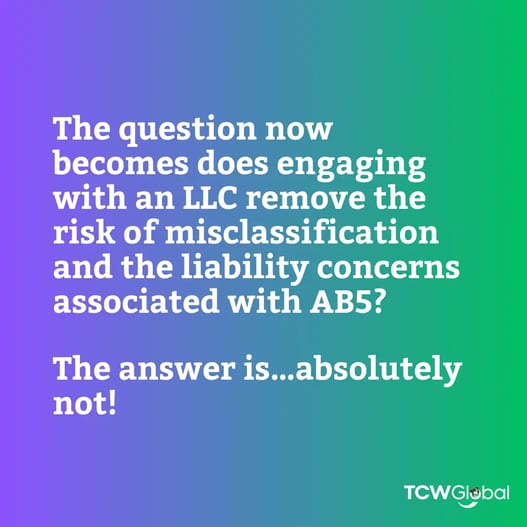Does B2B protect you from AB5?

August 28, 2023

The 12 "must-haves" in order for a B2B to qualify under AB5.
Following the enactment of AB5, there has been a large increase in applications to set up limited liability companies (LLCs) or other forms of B2B.
By forming these business entities, individuals that had previously operated as independent contractors are hoping to maintain their independent status. Forming an LLC is a rather straightforward and inexpensive process. The question now becomes does engaging with an LLC remove the risk of misclassification and the liability concerns associated with AB5?
The answer is…absolutely not!
Understanding the nuances of the “Business-to-Business” exemption is critical for companies that continue to engage in relationships with independent contractors.
The “Business-to-Business (B2B)” exemption is one of the narrowest in AB5. The statute defines these as relationships in which a “business service provider” provides services to a “contracting business.” This “exemption” only applies to entities that are actual “service providers” – defined as "a sole proprietorship, partnership, limited liability company, limited liability partnership, or corporation.”
However, to meet this exemption ALL of the following conditions must be met:
- The business service provider must be free from the control and direction of the contracting business entity in connection with the performance of the work, both under the contract for the performance of the work and in fact.
- The business service provider is providing services directly to the contracting business rather than to customers of the contracting business.
- The contract with the business service provider is in writing.
- If the work is performed in a jurisdiction that requires the business service provider to have a business license or business tax registration, the business service provider has the required business license or business tax registration.
- The business service provider maintains a business location that is separate from the business or work location of the contracting business.
- The business service provider is customarily engaged in an independently established business of the same nature as that involved in the work performed.
- The business service provider actually contracts with other businesses to provide the same or similar services and maintains a clientele without restrictions from the hiring entity.
- The business service provider advertises and holds itself out to the public as available to provide the same or similar services.
- The business service provider provides its own tools, vehicles and equipment to perform the services.
- The business service provider can negotiate its own rates.
- Consistent with the nature of the work, the business service provider can set its own hours and location of work.
- The business service provider is not performing the type of work for which a license from the Contractors State License Board is required, pursuant to Chapter 9 (commencing with Section 7000) of Division 3 of the Business and Professions Code.

In addition, satisfying the “Business-to-Business (B2B)” exemption alone does not in and of itself mean that you are free to enter into a relationship with the LLC as an independent contractor without risk.
For business service providers that meet the above exemption criteria (which only exempts them from the ABC test), the status of the subcontractor relationship must STILL be evaluated based on the preexisting “Borello” test.
The “Borello” test looks at multiple factors, including whether the potential employer has all necessary control over the manner and means of accomplishing the result desired, although such control need not be direct, actually exercised or detailed. This factor, which is not dispositive, must be considered along with the following other factors:
- Whether the worker performing services holds themselves out as being engaged in an occupation or business distinct from that of the employer;
- Whether the work is a regular or integral part of the employer’s business;
- Whether the employer or the worker supplies the instrumentalities, tools, and the place for the worker doing the work;
- Whether the worker has invested in the business, such as in the equipment or materials required by their task;
- Whether the service provided requires a special skill;
- The kind of occupation, and whether the work is usually done under the direction of the employer or by a specialist without supervision;
- The worker’s opportunity for profit or loss depending on their managerial skill;
- The length of time for which the services are to be performed;
- The degree of permanence of the working relationship;
- The method of payment, whether by time or by the job;
- Whether the worker hires their own employees;
- Whether the employer has a right to fire at will or whether a termination gives rise to an action for breach of contract; and
- Whether or not the worker and the potential employer believe they are creating an employer-employee relationship.
Understanding the nuances and complexities of the exemptions in AB5 is critical to avoiding liability. The “business-to-business (B2B)” exemption does not simply allow a contracting business entity to do business with an LLC without any risk of misclassification. California is gearing up its enforcement efforts and opening up the doors to audits and penalties for non-compliance. There are serious fines, back wages, potential other wage and hour violations, and ACA excise tax penalties to consider.
TargetCW has been helping companies with their contingent workforce needs and 1099 Compliance/Management for over a decade now. We are here to help you understand these exemptions, reach compliance, and manage the ever-changing legal landscape.
For more reading:
- 5 Simple Advantages of being a W2 compared to a 1099 Independent Contractor
- Achieve Compliance with Our Comprehensive Independent Contractor Program
- AB-5 Worker status: Employees and Independent Contractors
(CA Legislation)
“The information contained herein is for information purposes only and should not be construed as legal advice on any subject matter. You should not act or refrain from acting on the basis of any content included herein without seeking legal or other professional advice.”
